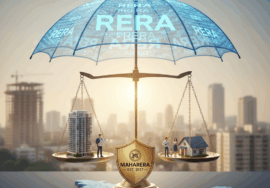TOP 40 Questions about MAHARERA
Must know 40 Questions about MAHARERA
Q1: What is the validity period of a real estate agent registration in Maharashtra?
The validity period of a real estate agent registration is 5 years from the date of issuance. The agent must apply
for renewal at least 60 days before expiry. The renewal is also valid for another 5 years.
Q2: What are the registration fees for individual and non-individual real estate agents?
Individual agent registration fee is ₹10,000. Non-individual agent (company/partnership/proprietorship)
registration fee is ₹1,00,000. Payment must be made through NEFT, RTGS, or other digital modes.
Q3: Which real estate projects are exempt from MahaRERA registration?
Projects exempt from registration: (1) Land area ≤ 500 sq. meters OR ≤ 8 apartments (all phases), (2) Projects
with completion certificate before Act commencement, (3) Renovation/repair projects without new
marketing/selling.
Q4: What is the maximum advance payment a promoter can accept without a registered agreement?
Maximum 10% of the apartment/plot cost can be accepted as advance payment without executing a registered
agreement for sale. Beyond this, a written and registered agreement for sale is mandatory.
Q5: What are the five key pillars of MahaRERA’s functioning?
The five key pillars are: (1) Transparency – maximum information disclosure, (2) Accountability – clear roles and
responsibilities, (3) Financial Discipline – fund management and audits, (4) Customer Centricity – protecting
allottee interests, (5) Compliance – adherence to rules and regulations.
Q6: What is the penalty for a real estate agent facilitating sale without registration?
₹10,000 per day for the period of default, which may cumulatively extend up to 5% of the cost of plot,
apartment, or building for which the sale or purchase has been facilitated.
Q7: How is carpet area defined under RERA?
Carpet area means net usable floor area of an apartment, excluding the area covered by external walls, service
shafts, exclusive balcony/verandah, and exclusive open terrace areas, but including the area covered by
internal partition walls.
Q8: What is the time limit for filing an appeal to MahaRERA?
Appeals must be filed within 60 days from the date of receipt of the Authority’s or Adjudicating Officer’s order.
MahaRERA may condone delay if sufficient cause is shown. Appeals should be disposed of within 60 days of
filing.
Q9: What documents must a real estate agent maintain for each project?
Agents must maintain separate books of accounts, records, and documents for each project as per Income Tax
Act, Companies Act, or applicable laws. Records include financial transactions, commission details, client
information, and all project-related communications.
Q10: What is the process for project registration extension by promoters?
Extension can be granted for force majeure reasons (war, flood, earthquake, etc.) for maximum 1 year in
aggregate. Promoter must apply with supporting documents and prescribed fees. Authority considers each case
based on facts and without default by promoter.
Q11: What information must promoters disclose quarterly on MahaRERA website?
Quarterly updates include: (1) Number and types of apartments/plots booked, (2) Number of garages booked,
(3) Status of approvals taken and pending, (4) Overall project status, (5) Financial and physical progress, (6)
Any other information as specified by Authority.
Q12: What is the defect liability period for promoters after possession?
5 years from the date of handing over possession. During this period, promoters must rectify any structural
defects or workmanship issues within 30 days of complaint, free of charge. Failure to rectify entitles allottees to
appropriate compensation.
Q13: What are the grounds for revocation of agent registration?
Registration can be revoked for: (1) Breach of Act/Rules/Regulations, (2) False information during registration,
(3) Non-compliance with Authority orders, (4) Unfair trade practices. No revocation without opportunity of
hearing. Post-revocation, cannot reapply for 6 months.
Q14: How does the 70% separate account rule work for promoters?
70% of collections from allottees must be deposited in a separate scheduled bank account for construction and
land costs only. Withdrawal must be proportionate to project completion percentage, certified by engineer,
architect, and chartered accountant. Annual audit mandatory.
Q15: What is TDS rate and applicability for property transactions?
TDS @ 1% is applicable on property transactions above ₹50 lakhs. Buyer must deduct and deposit TDS within
30 days. Form 26QB must be filed. Includes all charges like club membership, parking fees, maintenance fees
incidental to property transfer.
Q16: What are the key obligations of allottees under RERA?
Allottees must: (1) Make payments as per agreement schedule, (2) Pay their share of taxes, charges, and
maintenance, (3) Pay interest on delayed payments @ prescribed rate, (4) Participate in association formation.
(5) Take possession within 2 months of OC, (6) Participate in conveyance deed registration.
Q17: What constitutes unfair trade practices by real estate agents?
Unfair practices include: (1) False representation of services/standards, (2) Claiming approvals/affiliations that
don’t exist, (3) Making misleading representations, (4) Advertising services not intended to be offered, (5)
Facilitating non-registered project sales, (6) Not providing complete information to allottees.
Q18: What is the process for the change of promoter in a project?
Promoter cannot transfer majority rights without: (1) Prior written consent of 2/3rd allottees, (2) Authority
approval, (3) No extension of timeline granted, (4) Incoming promoter liable for all pending obligations. Both
outgoing and incoming promoters jointly liable during transition.
Q19: How does the conciliation forum work at MahaRERA?
Voluntary alternative dispute resolution mechanism. Parties apply online, pay fees, get assigned conciliator
panel. Conciliators facilitate amicable settlement. Settlement agreement is final and binding. Non-compliance
allows approach to MahaRERA. Cost-effective and time-saving process.

Q20: What are the GST rates for real estate transactions?
Under-construction properties: 5% GST (without input tax credit) for regular housing, 1% GST for affordable
housing (from April 2019). Ready-to-move properties are outside GST ambit. Earlier rates were 12% and 8% respectively with input tax credit.
Q21: What information must be displayed in agent’s marketing materials?
All marketing materials must prominently display: (1) Agent’s MahaRERA registration number, (2) Project’s
MahaRERA registration number, (3) MahaRERA website address where project details are available. This applies
to all advertisements, brochures, and sales documents.
Q22: What is the timeline for promoters to convey common areas to allottees?
Promoters must execute registered conveyance deed of common areas to association of allottees within 3
months from: (1) Date of occupancy certificate issuance, OR (2) When 50% allottees have paid full
consideration, whichever is earlier. This includes all common facilities and areas.
Q23: How is stamp duty calculated in Maharashtra for property transactions?
Stamp duty rates: 5-7% of property value based on ready reckoner rates. Women buyers get 1% concession.
For properties below ₹30 lakhs: rates may be lower. For joint ownership with women: beneficial rates applicable.
Agricultural land has different rates.
Q24: What happens when a project registration is revoked by MahaRERA?
Post-revocation: (1) Promoter cannot market/advertise project, (2) Listed as defaulter on website, (3) Project
bank account frozen, (4) Shared with other RERAs, (5) Authority may facilitate completion by competent
authority or allottees association, (6) Association of allottees gets first right of refusal for completion.
Q25: What is the procedure for filing complaints against non-registered projects?
Use “Inform Non-Registration” section on MahaRERA portal. Provide project details, location, promoter
information, and evidence of ongoing construction/marketing without registration. MahaRERA investigates and
takes appropriate action. Status tracking available online.
Q26: What are the key features of Model Agreement for Sale prescribed by MahaRERA?
Model agreement includes: (1) 8-stage payment schedule linked to construction milestones, (2) Interest clauses
for delays, (3) Termination conditions, (4) Possession procedures, (5) Defect liability period, (6) Force majeure
provisions, (7) Agent commission clauses, (8) Dispute resolution mechanisms.
Q27: How does deemed registration work for agents and projects?
If Authority doesn’t grant/reject registration within prescribed timelines (30 days for applications), the
application is deemed approved. Authority must provide the registration number within 7 days of timeline expiry.
This ensures no indefinite delays in the registration process.
Q28: What is the role of Adjudicating Officers in RERA framework?
Adjudicating Officers handle compensation matters under sections 12, 14, 18, and 19 of the Act. They
determine compensation amounts for false statements, delayed possession, defective title, or other violations.
Appointed by Authority for specific adjudication purposes.
Q29: What due diligence should agents perform before facilitating sales?
Verify: (1) Project MahaRERA registration status, (2) Promoter identity and credentials, (3) Title clearance and
encumbrances, (4) All required approvals and certificates, (5) Tax payment status, (6) Pending litigations, (7)
Carpet area calculations, (8) Allotment letter and agreement compliance with model forms.
Q30: What are the different types of real estate agents recognized under RERA?
Two types: (1) Individual Agents – single person business in own name, no employees, personal liability, (2) Non-
Individual Agents – proprietorship/partnership/company/society, multiple employees, organizational liability,
team structure with different roles.
Q31: How does the appeal process work in Maharashtra RERA framework?
Three-tier system: (1) MahaRERA Authority/AO – first level, (2) MahaRERA (Appellate Tribunal) – appeal within 60
days, disposal within 60 days, (3) High Court – final appeal against MahaRERA orders. Each level has specific
jurisdiction and powers.
Q32: What is the significance of quarterly project updates by promoters?
Ensures transparency for allottees to track: (1) Booking status of units, (2) Construction progress, (3) Approval
status, (4) Financial utilization, (5) Timeline adherence. Non-compliance attracts penalties. Updates visible on
MahaRERA website for public access.
Q33: What is the process for agent registration renewal?
Apply at least 60 days before expiry using Form ‘J’. Submit updated documents as per Rule 11(2). Pay same
fees as new registration. Authority reviews and issues Form ‘K’ for approval or Form ‘I’ for rejection. Renewed
registration valid for 5 years from renewal date.
Q34: How does the separate project account requirement ensure fund security?
70% of allottee payments go to separate scheduled bank account exclusively for construction and land costs.
Withdrawal only in proportion to completion percentage certified by engineer, architect, and chartered
accountant. Annual audit ensures proper utilization. Authority can freeze accounts for non-compliance.
Q35: What are the key differences between complaints and conciliation?
Complaints: Adjudicatory process, binding orders, penalties possible, formal procedure, Authority/AO decides.
Conciliation: Voluntary process, mutually agreed settlement, cost-effective, informal approach, parties control
outcome. Both have their place in dispute resolution ecosystem.
Q36: What constitutes force majeure for project extension purposes?
War, flood, drought, fire, cyclone, earthquake, or any other natural calamity affecting regular project
development. Extension limited to maximum 1 year in aggregate. Promoter must provide evidence and
supporting documents. Authority evaluates case-by-case without promoter default.
Q37: How does RERA protect allottee interests in case of project delays?
Multiple protections: (1) Interest payment @ SBI MCLR+2% for every month of delay, (2) Right to exit with
refund and interest, (3) Complaint filing rights, (4) Separate fund management ensuring money availability, (5)
Authority intervention powers, (6) Penalty provisions for promoters.
Q38: What is the role of Association of Allottees under RERA?
Promoter must facilitate formation within 3 months of majority bookings. Association represents allottee
interests, manages common areas post-conveyance, participates in project decisions, has first right to complete









